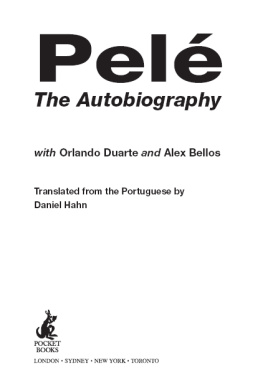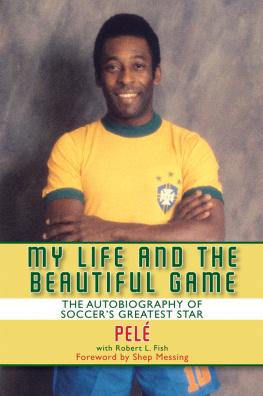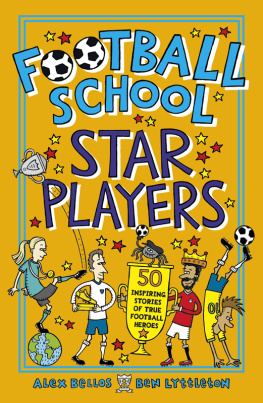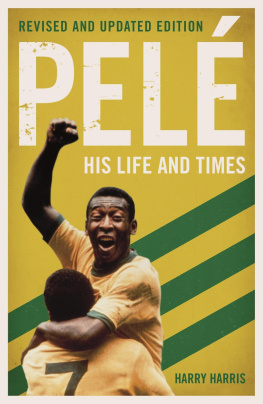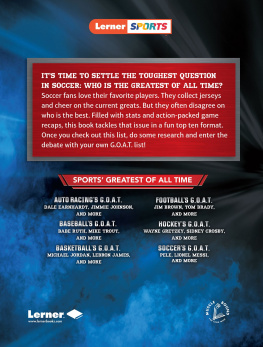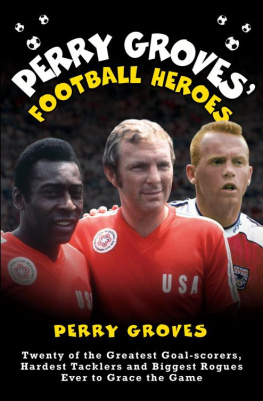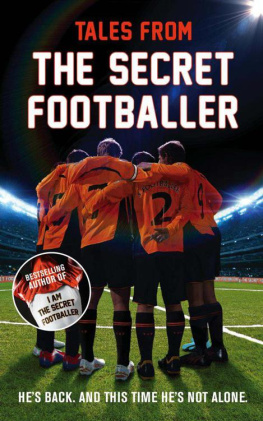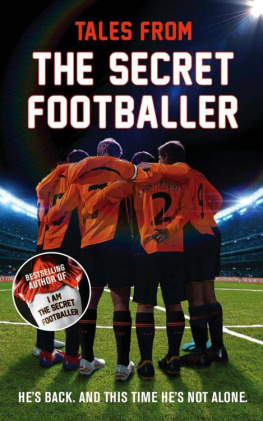This book is copyright under the Berne Convention.
No reproduction without permission.
All rights reserved.
The right of Edson Arantes do Nascimento to be identified as the author of this work has been asserted by him in accordance with sections 77 and 78 of the Copyright, Designs and Patents Act, 1988.
A CIP catalogue for this book is available from the British Library.
OBRIGADO
I want to thank:
FIFA, especially Sepp Blatter and Jerome Champagne, for suggesting that I write this book;
DUET, Henry Gabay and Alain Schibl, and also Jonathan Harris, for their help in bringing the autobiography to life;
Simon & Schuster UK and Andrew Gordon, for their extraordinary contribution;
Celso Grellet and Jos Pepito Rodrigues, who helped a lot;
Orlando Duarte and Alex Bellos, the writers;
my family, for their support during my career;
all the players who have passed away and who opened the door for me, in the name of my father, Dondinho;
and God, who gave me the gift to play football.
PREFACE
Planet Football
I m able to say that Im a happy man, because Ive had the support of so many of you to help me reach where I am today. And it is because of football that I have achieved whatever I have achieved. Every goal I scored, every goal we celebrated, was intensely feltwhether the first or the thousandth.
Im happy because Ive shared football pitches, and shots, and indeed much of my life, with players like Tosto, Garrincha, Clodoaldo, Pepe, Rivelino, Gilmar, Bellini, Jairzinho, Zagallo and so many others. I have lived through footballs golden years; the Brazil teams of 1958, 62 and 70 brought football to the whole world, made people fall in love with it. Our joyful way of playing gave the rest of the world a taste for this marvellous sport. In that time we spread a real passion for footballa passion that seems to be passed on in the genes, as children are born with a love for this game already in their hearts.
A boy who played with a ball made of socks, who moved on to play with a professional ball, on professional pitches, in teams that made history. I saw the world, met great peoplewonderful people. I never expected to fly so high.
Ill never forget my team-mates from the national squad or my domestic club, Santos. Our time was a pure one, innocent, almost rough-and-ready, in the sense of the simplicity which was within our reach, before technology invaded our lives. There was nothing modern in our day. Our strip was made of coarse cotton, our shorts were short and our boots heavy. Those shortsI think its funny watching old games where players have their whole legs and thighs showing; its all so much more elegant today. Football itself has changed too, with time, and there have been many improvements to the rules.
But the rules would mean nothing without all those idols who have to interpret them on the pitch; without whom we wouldnt have the spectacle that football has come to represent. To our mind, Brazil hadand still has nowadaysa special place in the world of football, a special brand, owing to being five-times World Champions, and having had so many brilliant players. Again I must acknowledge the privilege Ive felt in being able to play with them, my friends and team-mates, in so many of those great victories.
Football is special. You play in a group, you cant play it alonethere is something magical in the absolute harmony that exists among team-mates. A ball passed well to a striker is every bit as important as the goal itself. When its well tuned, it all comes out beautifully, as though we were taking part in a cleverly choreographed dance. And it really thrills the audience when this happens, they can appreciate the tone of the game, its beauty. I feel the spectators should be like the twelfth player on a team, so important are they in the spectacle as a whole. And the spectators, the fans, must be aware that there are rules for them toorespect for the club, for your opponents, for the players on the pitch, for the women in the stadium, for the children who will ensure that football wont die out in the future. They should have the right to be exuberant, to burst with music, songs, banners and much more, as long as they dont offend anybody. Aggression is the one thing that is inexcusable.
As players we get to befriend players from other clubs. Real friends. Were often invited to their homes, we get to know their families, and we are constantly searching for ways of improving football as a whole. The ambition should always be to play an elegant game. Because from that nucleus emerges an example that reaches everyone, in Brazil and beyond. This is what counts. We have to be worthy and competent to show the world that were not just five-times champions, but also people with feelings and manners, obeying the number-one rule of every sport, and of lifeto know how to lose.
I hope that this book, in which I talk about my life, might at some points serve as an example of what football has done for me, of what it means to me, and as a demonstration of the fact that if you want to succeed, you have to know how to face the challenge. In sport as in life: there are defeats, and there are victories.
E DSON A RANTES DO N ASCIMENTO
May 2006
The Boy from Bauru
The greatest goal I scored was a onetwo with Celeste: we named him Edson Arantes do Nascimento: Pel
DONDINHO, PELS FATHER
H owever long we may live, we never forget the time when we were young. Memory is like a film which we alone can watch. For me, childhood is the best part of that film: time and again my thoughts return to my experiences, the innocence and mischief of that time, and the dreams and nightmares too.
I was born in Trs Coraes in Minas Gerais, a state in the south-east of Brazil just to the north of Rio de Janeiro. It is an area very rich in minerals, especially goldthe early Portuguese explorers were thrilled at the abundance and brilliance of that rich yellow mineral and settled there to exploit it. Among them was a farmer. He was a responsible man, a hard worker, and was dedicated to the land hed acquired on the banks of the Rio Verde. He asked his superior for permission to build a chapel there, and permission was granted; when it was ready he named it the Holy Hearts of Jesus, Mary and Joseph. The name he gave the chapel was in tribute to the three Sacred Hearts in which the farmer had such faith, and which in turn became the name of the placeTrs Coraes, the three hearts.
Brazil, though, is a land of stories, and as you will discover throughout this book, a story in Brazil isnt worth telling unless there are alternative versions to call upon. And the three hearts are no different: some have it that the name refers to the love of three cowboys who were prevented from marrying three local girls; others hold that it is related to the fact that as the Rio Verde approaches the town it forms little curves like three little hearts. Im sticking with the farmer, thoughits the story I was brought up with, and one that has always appealed to me.

